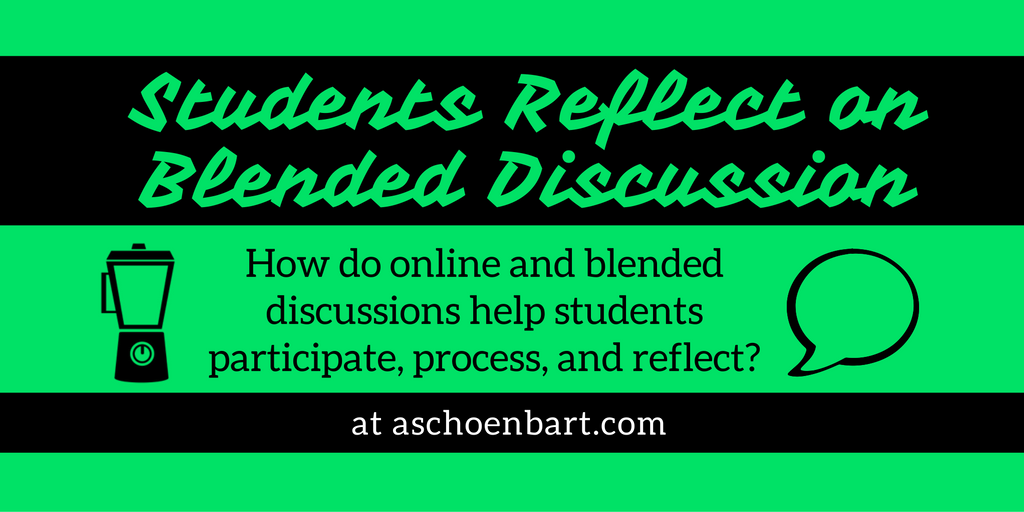Students Reflect on Blended Discussion

Tools and ideas to transform education. Sign up below.
You are now subscribed
Your newsletter sign-up was successful

At the end of every unit of learning this year, I ask my students to self-assess and reflect. I’ve explored different self-assessment protocols and strategies with my students, and am still trying to find out what works best for me and my classes.
At the end of our unit focusing on the graphic novel Maus II by Art Spiegelman and different forms of discussion, students completed a Google Form. This form asked students to assess their work in live class participation, online discussions, and in their projects. They selected a percentage of success and then supported their choices in writing.
In this work, students were asked:
- Evaluate your participation in our online discussions as a whole, including the Google Community, Today's Meet, and Twitter. How effectively did you share ideas and participate in online discussion?
- In this unit, we blended (mixed) live and online instruction and discussion. How did these online discussions help or hinder your understanding and analysis of the text and our work this week?
Find more about our blended discussions in 3 Tools for Blended Discussion and Using Technology to Enhance Student Voice and Audience.
Below, find some student responses for their reflections to the experience of blended and online discussions.
- It wasn't any different than live conversation to be quite honest. It helped me like any regular discussion would and did not hinder my analysis. At least I don't think so.
- The online discussions were helpful in that everyone had a voice and everyone could see the many different opinions of classmates. I sometimes felt that they hindered the discussion by moving too quickly or not delving deeper into important questions, as the case sometimes was on Today's Meet.
- I didn't necessarily mind using online discussions and tools to work on this project I think they were useful to some people who don't like to talk in front of the class but have something to contribute to the discussions.
- It helped me think about specific relationships between characters (i.e. Art and Vladek, Vladek and Anja). Whenever I heard someone saying something interesting I wanted to support their analysis or go against it and give constructive feedback. I learned a lot more about Art's purpose behind the story too.
- I feel the online discussion gave those who would normally choose not a speak an opportunity to show their understanding of the reading. (This does not apply to me however.)
- I felt like the online discussions helped me because I participated more in those and I could read the answers again in case I didn't understand them the first time.
- The online discussions were different than just simply in person discussions. Socratic Seminars are a bit easier for me because I am not a big fan of technology. So online discussions weren't my favorite.
- The online discussion helped me understand a lot more. It helped me understand a lot more because i got to see another persons point of view that i haven't thought of, and it made me think.
Read more about our journey in reflection and self-assessment in Student Reflections and Self-Assessment and When Students Self-Assess: Sharing Reflections and Feedback.
As I read through their reflections, I’ve noticed interesting trends in the data. Almost every student’s self-assessment was within 7% of mine. Some scored higher and others lower, but we were close enough for my comfort. Their range of responses were interesting, with a variety of ideas. We intentionally practiced different tools that had difference paces, levels of depth and inquiry, and difficulty. I wanted to push students to engage and participate in new and different ways.
Tools and ideas to transform education. Sign up below.
While some students enjoyed the speed of a Today’s Meet chat, others found it overwhelming. Some liked the depth of a Google Community post, but for some it was repetitive. Many ended up writing about similar ideas. Still, most recognized the opportunity that blended discussions give for voice and audience, noting that more students participated more often and more deeply than before. We can always do butter, but right now that’s a win in my book.
How do you promote reflection and metacognition in your classroom? How do students feel about blended and online discussion? Please share your thoughts in the comments or on Twitter @MrSchoenbart.
cross posted at www.aschoenbart.com
Adam Schoenbart is a high school English teacher, Google Education Trainer, and EdD candidate in Educational Leadership. He teaches grades 10-12 in a 1:1 Chromebook classroom at Ossining High School in Westchester County, NY and received the 2014 LHRIC Teacher Pioneer Award for innovative uses of technology that change teaching and learning. Read more at The SchoenBlog and connect on Twitter @MrSchoenbart.
